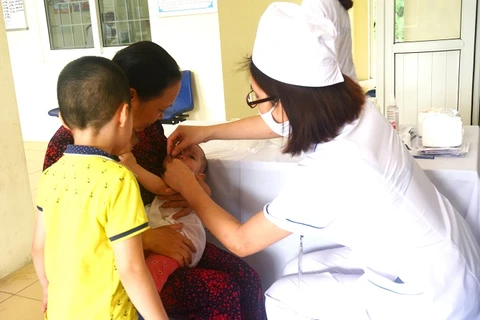 International conference brings together more than 300 experts at home and abroad. (Photo: VietnamPlus)
International conference brings together more than 300 experts at home and abroad. (Photo: VietnamPlus) Hanoi (VNA) - Although the stunting and malnutrition rate among children has been improved, Vietnam is still facing three childhood-malnutrition-related burdens, namely malnutrition, obesity and micronutrient deficiency, especially iron and zinc. Therefore, appropriate and timely nutritional supplementation for children is a must, heard an international conference themed "Nutritional formula products from fresh milk - golden nutrition for optimal development.”
The conference, which was organised by Vietnamese dairy producer TH Group on June 8 in Hanoi, drew the participation more than 300 experts, representing prestigious national and international nutrition research organisations and agencies.
Nguyen Song Tu from the National Institute of Nutrition (NIN) said the height of young Vietnamese people has increased – currently the average height of men is 168.1 cm, for women is 156.2 cm – but it is still lower than many countries in the region and lower than the standards of the World Health Organiation (WHO), citing the 2019-2020 National Nutrition Census conducted by NIN.
Vietnam is also facing issues of obesity, malnutrition, and micronutrient deficiencies among children, the survey showed.
Specifically, the national stunting rate among children under five was at 19.6% in 2020, while that in the mountainous regions is up to 38%.
The obesity rate among children aged five to 19 increased to 19% in 2020 from 8.5% in 2010, with 26.8% recorded in urban areas, 18.3% in rural areas and 6.9% in mountainous areas.
The lack of micronutrients, particularly vitamin A, iron, and zinc, remains an issue of concern. In 2020, anemia prevalence among children under five years old in Vietnam was 19.6%, surpassing the set target of 15%. The prevalence of zinc deficiency was particularly high, at 58%, which was severe according to WHO standards. The rate even climbed to 67% in northern mountainous and Central Highlands regions. In urban areas, it reached 49%, and saw little improvement between 2015 and 2020.
According to experts, proper nutrition in the first years of life plays an important role in improving the health, physical stature, and intelligence of future generations.
A study by the Southeast Asian Nutrition Organisation revealed that the daily meals of Vietnamese children lack up to half of the vital micronutrients.
A lack of micro and other essential nutrients, or an unbalanced diet, can affect the health and development of children, especially in terms of resistance to disease, digestion, and brain development.
Proper nutrition supplement
Speaking at the event, Dr. Clair -Yves Boquien from France’s human nutrition research centre said that according to WHO recommendations, around six months of age or older, infants energy and nutrient needs begin to exceed the capacity provided by breast milk, and complementary foods are needed to meet those needs. Therefore, WHO has provided guidelines for appropriate dietary supplementation, including the use of micronutrient-fortified foods or vitamin-mineral supplements when it is necessary, adding that diversifying food for children aged six months and older is essential.
In the first years of life, proper nutrition plays a crucial role in reducing mortality rates and the risk of contracting diseases throughout a child's lifetime, he said.
Investing in good nutrition in early childhood brings long-term benefits to individuals, families, and the nation, he continued.
The expert suggested that socioeconomic and geographical identities of each country should be taken into account during nutritional supplement for children in order to promote optimal development.
Echoing the view, Associate Professor, Dr Nguyen Thi Lam took an example that Japanese children are iodine sufficient because Japanese people regularly use seaweed and algae in their meals. Thus, Japanese domestic milk rarely supplements this element, while Vietnamese milk production units always focus on nutritional supplementation, aligning with the characteristics of Vietnamese children, including iodine deficiency.
Echoing the view, Associate Professor, Dr Nguyen Thi Lam took an example that Japanese children are iodine sufficient because Japanese people regularly use seaweed and algae in their meals. Thus, Japanese domestic milk rarely supplements this element, while Vietnamese milk production units always focus on nutritional supplementation, aligning with the characteristics of Vietnamese children, including iodine deficiency.
Dr Alwine Kardinaal, Expertise Group Leader Nutrition & Health at Nizo - an independent and private contract research organisation of the Netherlands dedicated to improving food and health products, said among infant formula products for children of different ages, nutritional products derived from fresh milk with ingredients similar to breast milk have received special attention in recent years.
New options
At the conference, TH Group introduced a new breakthrough solution, a nutritional product formulated from fresh milk, providing a golden source of nutrition for children to develop comprehensively - TH true FORMULA.
According to Associate Professor, Dr. Nguyen Thi Lam, this is the first fresh milk product applied according to the national technical regulations on nutritional products for babies, the first in Vietnam.
Analysing from the perspective of a nutrition expert, Lam said that TH true FORMULA nutritional product has balanced nutritional ingredients, supplemented with micronutrients that fresh milk lack such as zinc, iodine, and soluble fiber and HMO.
TH true FORMULA has brought the desired results when supplementing missing substances to fresh milk, which is already rich in phosphorus and calcium, Lam said.
When a product is identified as a "formula nutritional product", meaning it meets strict regulations, she said, adding that it gives parents more options to supplement both fresh milk and appropriate micronutrients, which in line with strict nutritional standards.
Sharing the new product line, Professor, Dr. Le Thi Hop, advisor to the TH Nutrition Institute, said that the TH true FORMULA nutritional product set contains the main nutrients derived from nature, such as MFGM, DHA, ARA, HMO, FOS, and GOS. The formula has undergone stringent quality assessments and met national standards for formula-based nutritional products for children. The product is also in line with the world trend of infant-oriented formula-based nutrition.
 Nutritional products formulated from fresh milk are the passion and meticulous research of TH Group and nutrition experts. (Photo: VietnamPlus)
Nutritional products formulated from fresh milk are the passion and meticulous research of TH Group and nutrition experts. (Photo: VietnamPlus) In addition, to meet the diverse needs and consumption habits, TH Group launched a line of powdered nutritional products for children from 2-6 years old with milk ingredients sourced from Australia’s international standard farms.
Previously, TH Group has deployed many breakthrough nutritional solutions specifically for age groups, such as clean fresh milk lines with TOPKID formula, successfully researched the fresh milk formula supplemented with micronutrients for school age – the product is certified by the Ministry of Health to be effective in improving the nutritional status and height of preschoolers and elementary school students; TH true MILK HILO product which is rich in calcium and low in fat for all ages and suitable for people with lactose intolerance; TH true MILK GOLD product with formula for the elderly; TH true CHOCOMALT MISTORI barley milk drink provides a completely natural source of energy for children.
Speaking at the conference, Hero of Labour Thai Huong, Chairwoman of TH Group, said that over the past 13 years, since the launch of fresh and clean TH true Milk, TH has gradually researched formulas to create the most complete products that are in line with the world’s trends and standards as well as those of developed countries.
“Even though Vietnam is a developing country, for all Vietnamese nutritional products, especially those for children, we follow developed countries. If we don't pursue the best, we're missing out on opportunities. Let's make a glass of milk for the children with a mother's heart and soul," said Huong./.


























